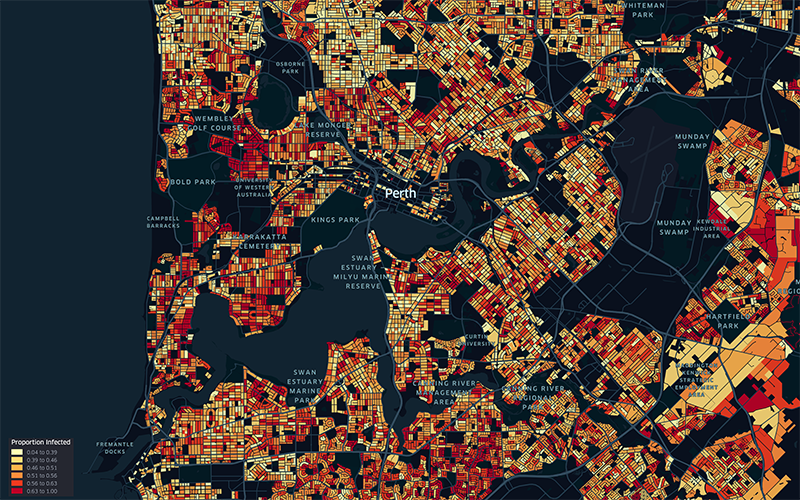Search

Our Child Health Analytics Team uses cutting-edge technologies to better understand how and why the health and wellbeing of children varies from place to place. We develop innovative geospatial methods that can harness large, complex datasets to pinpoint hotspots of elevated risk, evaluate change through time, and explore underlying drivers.

News & Events
Sophisticated new modelling suggests keeping mask mandate could prevent 147,000 COVID-19 casesWA’s current Omicron COVID-19 outbreak could jump by 147,000 cases if mask mandates are abandoned before the Easter long weekend, according to sophisticated new modelling.

News & Events
New study identifies African ‘hotspot’ for highly infectious diseasesA regional corner of Africa is a hotspot for cases of HIV, tuberculosis and malaria, prompting researchers to call for targeted health support rather than a national response.
Research
Comodity forecastingProject description This project support the development of 10-year global forecasts of nets, insecticides, diagnostics, and treatments for malaria
Research
Geospatial joint modeling of vector and parasite serology to microstratify malaria transmissionThe World Health Organization identifies a strong surveillance system for malaria and its mosquito vector as an essential pillar of the malaria elimination agenda. Anopheles salivary antibodies are emerging biomarkers of exposure to mosquito bites that potentially overcome sensitivity and logistical constraints of traditional entomological surveys.
Research
Community knowledge, attitude, practices and beliefs associated with persistence of malaria transmission in North-western and Southern regions of TanzaniaDespite significant decline in the past two decades, malaria is still a major public health concern in Tanzania; with over 93% of the population still at risk. Community knowledge, attitudes and practices, and beliefs are key in enhancing uptake and utilization of malaria control interventions, but there is a lack of information on their contribution to effective control of the disease.
Research
Trends in treatment-seeking for fever in children under five years old in 151 countries from 1990 to 2020Access to medical treatment for fever is essential to prevent morbidity and mortality in individuals and to prevent transmission of communicable febrile illness in communities. Quantification of the rates at which treatment is accessed is critical for health system planning and a prerequisite for disease burden estimates.
Research
Mapping age- and sex-specific HIV prevalence in adults in sub-Saharan Africa, 2000–2018Human immunodeficiency virus and acquired immune deficiency syndrome (HIV/AIDS) is still among the leading causes of disease burden and mortality in sub-Saharan Africa (SSA), and the world is not on track to meet targets set for ending the epidemic by the Joint United Nations Programme on HIV/AIDS (UNAIDS) and the United Nations Sustainable Development Goals (SDGs).
Research
The Prevalence of HIV Infection in Minority Indigenous Populations of the South-East Asia and Western Pacific Regions: A Systematic Review and Meta-analysisA random effects meta-analysis was used to estimate the pooled prevalence of HIV infection within minority indigenous populations of the South-East Asia (SEAR) and Western Pacific Regions (WPR). Sub-group analyses were conducted, and the sources of heterogeneity explored through meta-regression. The majority of studies were undertaken in high HIV risk subpopulations.
Research
A novel statistical framework for exploring the population dynamics and seasonality of mosquito populationsUnderstanding the temporal dynamics of mosquito populations underlying vector-borne disease transmission is key to optimizing control strategies. Many questions remain surrounding the drivers of these dynamics and how they vary between species-questions rarely answerable from individual entomological studies (that typically focus on a single location or species).
